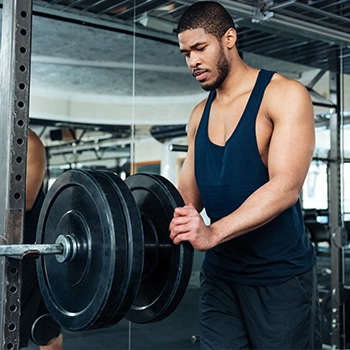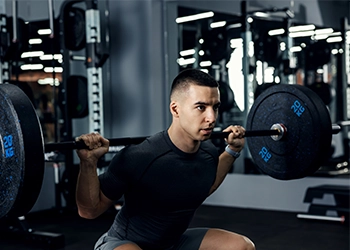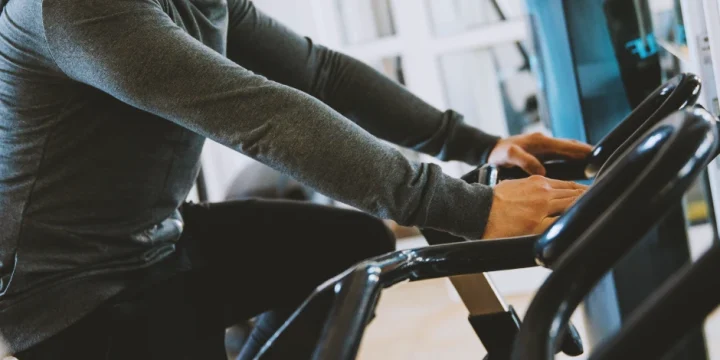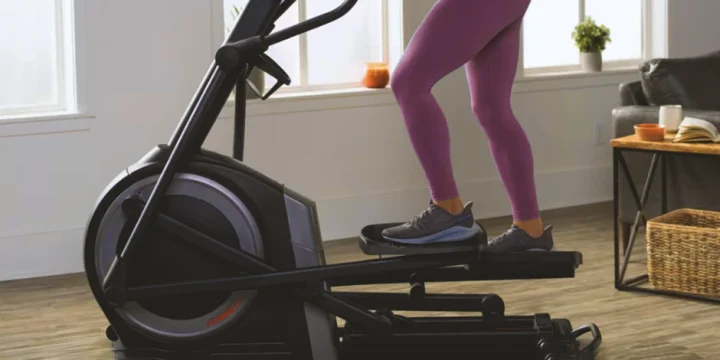Since my earliest days in the fitness world, there’s been an ongoing discussion about the best weight training approach - free weights or machines.
Some of my colleagues consider free weights crucial for building muscle, while others say machines made the most notable bodybuilders.
To try and avoid individual biases, I called up 11 fitness colleagues to discuss both their personal and coaching experiences in an effort to find out which approach may edge out the other.
Let’s dive in.
Quick Summary
- Our free weights vs. machines discussion showed that both are able to contribute to your strength training routine in a slightly different way, as each approach has a unique impact on muscle development.
- A free weight exercise may help you get bulkier faster as they usually hit several muscle groups, but the risk of injury is much higher as they require strict form.
- Weight machines are safer and better for isolating and hitting specific muscles, but their overall impact on muscle growth is lower.
Free Weight vs Machines - Which One to Choose?

Which one you should choose depends on your fitness goals, fitness level, personal preference, and access to weight training equipment.
Both free weights and weight machines are beneficial - they can be used to target the same muscle groups, and they might offer similar physical benefits. It’s some particular nuances that set them apart.
We’ll discuss those in much more detail soon.
Free weights are virtually any weight that can be moved in any direction freely (dumbbells, barbells, kettlebells, medicine balls, weighted ankle cuffs), activating several muscles simultaneously.
Free weights require you to control and stabilize the load you’re lifting and the path along which you’re lifting it.
On the other hand, weight machines (plate-loaded machines or pin-loaded machines) are fixed and sturdy units that allow you to move a weight in a single direction or bidirectionally, along the fixed path, isolating the specific muscle.
Free weights versus machines show that one isn’t necessarily better than the other, as both strength training approaches have advantages and disadvantages.
Let’s get into them in more detail.
The Pros And Cons of Free Weights

With free weights, you need to move the load without support and balance, so more muscle groups have to work (in different ways) throughout every rep.
This movement pattern brings several benefits but also has some potential downsides.
Let’s examine them more closely.
Related Articles:
- Moving the load without support (simulating real-life lifting situations) activates multiple muscles to stabilize your body, allowing you to execute more functional training than machines.
- Compound movements like deadlifts, bench presses, squats, and lunges help build balance, coordination, stability, and core control.
- Unlike resistance machines, free weights are also inexpensive and versatile.
- As your body has to work extra hard to control itself through the entire range of motion, your risk of injury is much higher. One study showed that more than half of injuries at fitness facilities occurred while training with free weights [1].
- Those injuries often happen due to overestimating strength, having poor form, or dropping the weight on a body part (the consequence of failing to execute a rep).
- Therefore, if you opt for free weights, you must pay attention to your form and go slowly and lighter. It’s also highly recommended to have a spotter (someone willing to help you).
The Pros and Cons of Machines
Though often not as functional as free weights, weight machines (i.e., a leg press or a leg-extension machine) have some important advantages.
Let’s explore those perks and drawbacks.
- Machines are better for isolating a muscle and providing more time under tension. This constant tension maximizes muscle growth [2].
- One study noted that machines’ built-in stability allowed gym-goers to lift far more and make greater gains in specific muscles compared to free weights [3].
- Resistance machines can also make certain exercises easier and more intuitive, thanks to their design. Machine weights are great for beginners as they reduce the risk of injury, guide the proper form, and usually, people quickly learn to use them.
- This makes them a better option if you are starting out or recovering from an injury.
- By allowing you to move weight in only one particular direction, machines make it harder to build full-body strength, control, and balance, as well as strengthen the stabilizer muscles. This often results in slower overall body transformations.
- Moreover, most machines are designed with the average-sized person in mind and aren’t one-size-fits-all like free weights, which might compromise your form or comfort.
FAQs
Why Do Bodybuilders Use Machines More Than Free Weights?
Bodybuilders use machines more than free weights because they allow constant tension on one muscle or a muscle group throughout the entire range of motion. Machines are designed to isolate specific muscles, which is challenging to replicate with free weights.
Are Free Weights or Machines Better for Seniors?
For seniors, both free weights and machines can be beneficial. However, since seniors are more prone to injuries, they should opt for machine weights.
Utilize Both Approaches
Try both to keep a workout balanced and effective.
Vivian Yu, founder of fitness site Gym Near Me, advises mixing in some free weights and movements that mimic real-life actions along with machine exercise to promote overall strength and agility.
If you have nailed down consistency, proper exercise form, and technique, then both free weights and machines should have a role in your regular strength training routine.
The former might help you get bulkier; the latter may give your muscles a more defined shape.
However, if you plan on creating your own home gym, you should consider investing in both:
We’ve tested and reviewed a ton of equipment to come up with these lists of the most convenient and effective gear for home gyms.
References:
- https://www.ncbi.nlm.nih.gov/pmc/articles/PMC5005555/
- https://www.ncbi.nlm.nih.gov/pmc/articles/PMC3285070/
- https://pubmed.ncbi.nlm.nih.gov/20940634/
About The Author
You May Also Like






